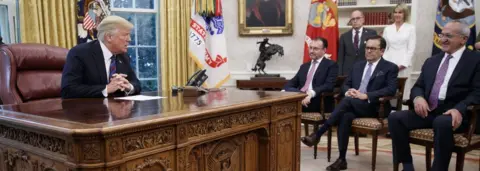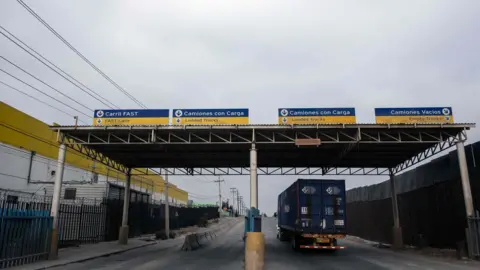Trump hails 'really good' trade deal with Mexico
The US and Mexico have agreed to revamp Nafta, the North American Free Trade Agreement, in what Donald Trump called a "really good deal" for both countries.
The US President, who has frequently criticised the existing deal, made the announcement on Monday.
Canada - the other member of Nafta - is yet to agree to the new terms and will hold more discussions on Tuesday.
Mr Trump had threatened to pull out of the deal, triggering a year of talks.
He demanded a renegotiation of the 1994 trade agreement, which he blames for a decline in US manufacturing jobs, especially in the car industry.
US shares rose and the Mexican peso strengthened on news of the preliminary deal on Monday.
What has Trump said?
Mr Trump said the US and Mexico had agreed on terms that would make for a deal that was "much more fair".
Negotiators have been rewriting the Nafta treaty over the past year, but in the past five weeks, Canada has not been part of the discussions.
"We will see whether or not we decide to put up Canada or just do a separate deal with Canada," Mr Trump said.
He also threatened Canada with tariffs on cars and said he wanted to get rid of the name Nafta, which he said has "bad connotations".
Where does Canada stand?
Canadian Prime Minister Justin Trudeau has had a "constructive conversation" with Mr Trump since the deal with Mexico was announced, his office said.
Canadian foreign minister Chrystia Freeland is expected to travel to Washington DC for talks on Tuesday.
 EPA
EPAWhy now?
Negotiators want to agree a deal before the newly elected Mexican president, Andres Manuel Lopez Obrador, takes office in December. He has been reluctant to continue Enrique Pena Nieto's police of opening up of Mexico's energy sector, which could complicate negotiations.
In order to meet that deadline, the Trump administration must present Congress with a deal at least 90 days in advance - meaning the deadline is this Friday.
However, Mr Obrador said on Monday that the two-way agreement with the US was just the first step in a new treaty.
"We're very interested in it remaining a three-country deal," he said. "The free-trade agreement should remain as it was originally conceived."
Will Canada join?
A spokesman for Ms Freeland said the country was "encouraged" by the progress made by the US and Mexico but did not comment on the specific terms.
The US and Canada have been at loggerheads on a range of trade matters, including Canadian protections for its dairy industry and US tariffs on steel and aluminium.
"We will only sign a new Nafta that is good for Canada... Canada's signature is required," said spokesman Adam Austen.
A senior US trade official said: "There are still issues with Canada but I think they could be resolved very quickly."
In a televised telephone call with Mr Trump, Mr Pena Nieto stressed the importance of an agreement that includes Canada.
However, Mexican foreign minister Luis Videgaray said his country was prepared to strike a bilateral US-Mexico deal.
What's in the agreement?
Nafta covers more than $1tn (£780bn) in annual trade.
The update is to include provisions to govern intellectual property, digital trade and investor disputes, among other issues.
In the preliminary agreement announced on Monday, the US and Mexico agreed that 75% of a product must be made in the two countries to receive tax-free treatment - higher than in the existing deal.
On cars, the two sides also settled on rules that will require 40% to 45% of each vehicle to be made by workers earning at least $16 an hour to discourage firms from moving production to lower-wage Mexico.
The pact would last for 16 years, the US said, and be reviewed every six years - but will not carry the threat of automatic expiration.
Can they meet the tight deadline?
 Getty Images
Getty ImagesPoliticians in all three countries have the final say over trade agreements.
In the US, Republicans, who typically support free trade, have pressed the White House to strike a deal, arguing that the relatively open borders have benefited American farmers and other groups.
Senator John Cornyn, a Republican from Texas, called the development a "positive step", adding: "Now we need to ensure the final agreement brings Canada into the fold and has bipartisan support."
The US Chamber of Commerce also said it was critical that the agreement continued to include Canada.
